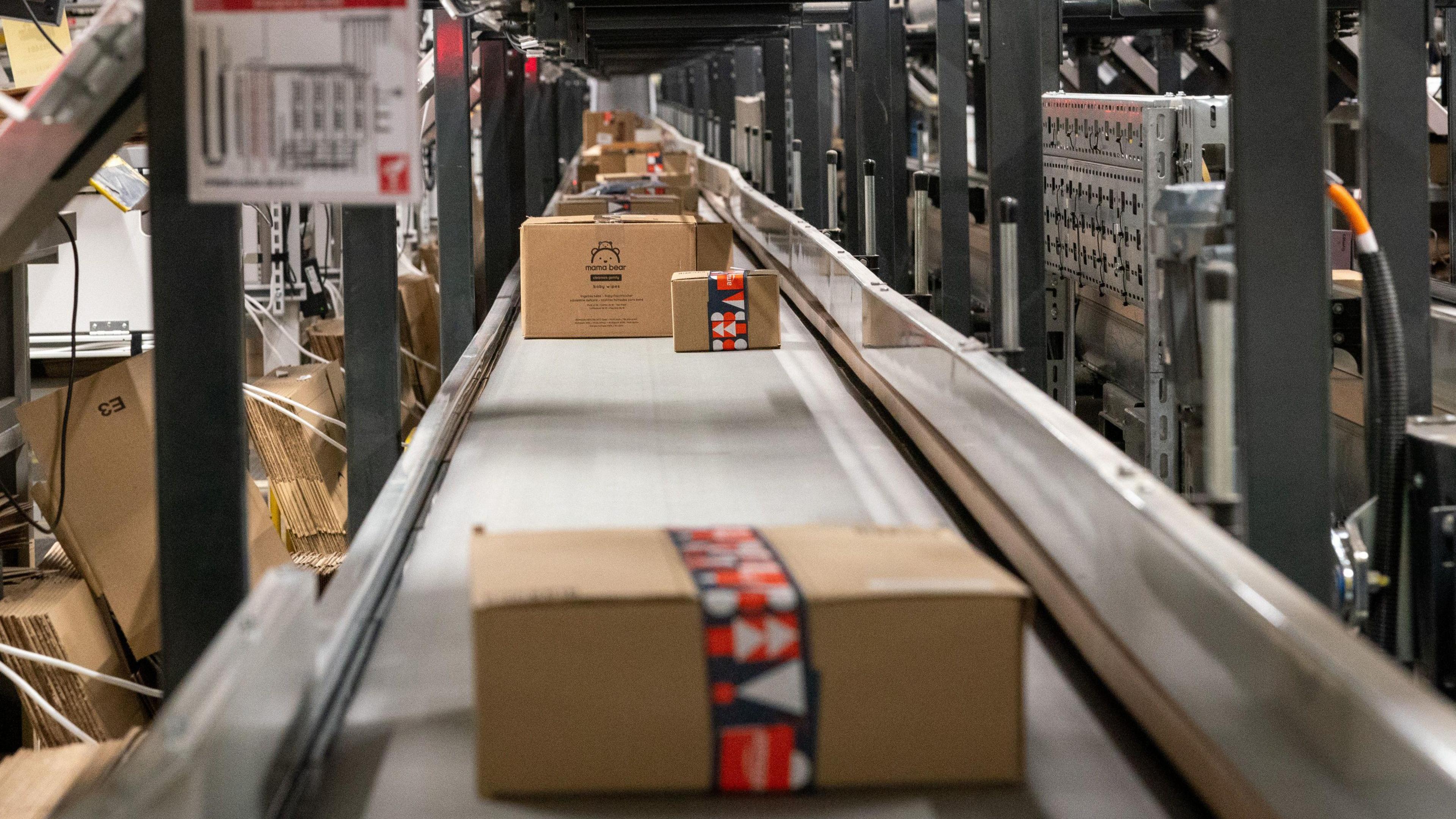Some businesses suspend NI sales due to new trade rules

Johanna Haughey-Lewis from County Armagh is running a business in London
- Published
New rules that affect businesses in Great Britain selling to Northern Ireland and the EU are a "step backwards", according to a London-based small business owner.
The EU's General Product Safety Regulation (GPSR) creates new requirements for Great Britain businesses, including the need to have an agent in Northern Ireland or the EU.
This has prompted some businesses to stop or suspend sales to Northern Ireland and the EU.
The government said it has been supporting small and medium businesses across the UK to get ready for GPSR.
However, Johanna Haughey-Lewis, the owner of homewares business Weirdstock, said "there hasn't been enough time or enough information in order to get this right".
Found out through social media
The rule change applies to Great Britain products going to Northern Ireland because Northern Ireland's Brexit deal means it is still effectively in the EU's single market for goods.
Weirdstock, which sells bedding, is among those that have decided to pause shipping to the EU and Northern Ireland.
Ms Haughey-Lewis, who is originally from County Armagh, said she found out about the new rules "through a social media post a couple of weeks ago".
"Whenever you look at the government website, the information on GPSR only came up there very recently, so not enough time for businesses to prepare," she told BBC Radio Ulster's Good Morning Ulster programme.
"Even some of the bigger retail stockists that I am with have only communicated about this for the first time this week, a few days before the deadline.
"So it's not just the small businesses that aren't aware of it; there has been no kind of campaign or information about it," she added.
'No template... no guidance'
Ms Haughey-Lewis informed her customers of the changes on social media.
"As many of you know I am from Northern Ireland, Weirdstock has a wee customer base there so I am finding this particularly frustrating.
"But at the same time I am determined to find a solution," she wrote.
She said her Northern Ireland connection may potentially make it easier for her to find an agent but there are other challenges.
The new requirements include the need to provide documentation to demonstrate the safety of your product.
"There is no template for that, no guidance. It is very hard to find information on that," Ms Haughey-Lewis said.
"This new legislation which feels like it has come out of nowhere, a bit of a surprise to me, it really has felt like a step backwards".
She is hoping that because her textile supplier in India is certified by global sustainability bodies it means the safety and traceability evidence will be there, but for now she is not clear exactly what she has to provide.
"Hopefully I will be in a better position than other people because I have those certifications already," she added.

Sammy Wilson said that businesses have been "abandoned"
The Democratic Unionist Party (DUP) MP Sammy Wilson said that the UK government and local politicians had "abandoned many traders" who he said were now "affected by mad EU trade rules".
Wilson told the BBC's Good Morning Ulster programme that he wrote to the government in September to warn them of these issues but that "nothing has been done".
Alliance Party assembly member Kate Nicholl said there were "clear issues with communication and how the government have been engaging with those businesses".
She said Brexit had been a "disaster" for Northern Ireland, but that removing the current trade regulations under the Windsor Framework would cause "even more damage and uncertainty for businesses in Northern Ireland".
"We just have to try to find solutions of how we can make this as easy as possible," she said.
'Barrier to international trade'

The rules have prompted some Great Britain businesses to stop or suspend sales to Northern Ireland
The EU has been working on GPSR since 2020 and it was approved by the European Parliament in May 2023.
It updates existing rules to reflect the growth of online commerce and aims to give better protections for consumers.
That include the need to have a "responsible person", which is effectively a compliance agent, inside the EU or Northern Ireland.
That is a particular challenge for small businesses in Great Britain who are selling direct to consumers, therefore they have no physical presence in the EU or Northern Ireland.
The Federation of Small Businesses (FSB) is calling on the government to give better export support to firms.
Tina McKenzie, policy chair at the FSB, said: "GPSR will be a real barrier to international trade for some of our small firms looking to export to EU member states, but also move goods to Northern Ireland.
"While the UK government's newly published guidance is helpful, small firms are still faced with the complexity and associated costs around it.
"Governments from both sides should look at removing unnecessary trade barriers, not least those arising from the product safety rules, for small businesses in the UK-EU Trade and Cooperative Agreement review in 2026."
It is understood the government expects GPSR to have a limited impact on the UK internal market as it largely formalises the reality of how many businesses are already operating.
Related topics
- Published1 December 2024

- Published26 November 2024

- Published30 September 2024
